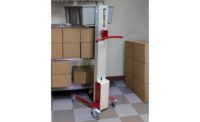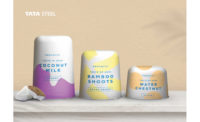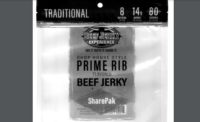Surface Style
Manufactured with highly accurate and efficient processing equipment, today’s premium sausage products require casings with superior sensorial properties.
Always seeking new ways to differentiate their products from the competition, savvy sausage manufacturers are finding answers in sausage casings. Characterized by eye-popping colors, high-print definition, unique flavors, and weight and link uniformity, premium sausage products featuring casings with enhanced consumer appeal are finding their way into meat and deli departments everywhere.
“The market continues to search for means to differentiate products on the shelf,” affirms Ralph Schuster, director of sales and marketing – North America and Asia, Unipac Embalagens Ltda., São Paulo, Brazil. “Processors demand packaging that enhances the appeal of their products and thus increases sales.”
Schuster points to Unipac’s plastic casings, available in 45 colors and matte or high-gloss finishes, as one way processors can uniquely identify their products on the shelf. “The high-print definition available today could never be achieved on the fibrous casings that previously dominated the industry,” Schuster contends, adding that Unipac, whose North American headquarters is located in Naperville, IL, offers product printing in six-to-10 colors.
Among Unipac’s casing innovations, Darlon ET or “easy tear” plastic casings [Lisle, IL-based Teepak LLC distributes Darlon casings for Unipac in the United States and Canada] allow a spiral tear at the point of sale rather than a peeling of the casing, which facilitates presentation and slicing at the deli-counter. Darlon EF or “easy fill” plastic casings provide greater elasticity without compromising their superior properties, Darlon EF allows stuffing with the minimal pressure normally associated with hand stuffing, and Darlon BX plastic casings create unique finished product shapes, producing either a “football” or round-shaped product.
Steve Devcich, marketing manager for Teepak LLC, points to sausage casings’ ability to differentiate products through surface color and flavor as key benefits for retail and foodservice customers. “Everything has color or flavor on the surface, whether it’s at a supermarket or a sub sandwich line,” he observes. “And we believe that putting color and flavor into the casings and allowing the customers to achieve those attributes in that manner is most cost-effective. It’s fast and consistent, and provides higher processing yields and greater outputs.”
As a result, Teepak has extended its longstanding Smoke-E fibrous smoked casings with such smoked varieties as mesquite, applewood, cherrywood, and oak, and has expanded its line of caramel casings with light, medium, dark, and black caramel varieties. “Addressing color and flavor through casings gives flexibility to the product and marketing organizations in the meat and poultry industry, allowing them to make diverse products, which are higher value products in the marketplace,” Devcich stresses. “It allows [processors] to distinguish their products more broadly without the high costs required to make small batches.”
Also aware of the importance of casing flavor and visual appeal, Dave McCaffrey, vice president and general manager of Oak Brook, IL-based Inovpack Vector Inc., notes that his company’s Enhance SmokeKote and ColorKote casings impart a flavorful, smooth, natural surface color and flavor and do not flake off during slicing because the unique coatings are made entirely of smoke constituents.
The Vector Enhance series, specifically designed to impart surface color or color/flavor, is among the newest introductions to the Inovpack Vector line. Its key features include very high cook/slice yields, natural colors, clean labeling due to all-natural smoke ingredients, and excellent barrier properties.
Vector B-5, another new product, is a flat sheet casing for cook-in form/fill/seal applications. Its features include a very wide sealing range, excellent barrier properties, and balanced shrink. “This film is used in the new, high-speed units for large-scale production,” McCaffrey notes, adding that Inovpack Vector also has introduced the Vector NSC line of non-shrink, economically priced, high-moisture barrier, cling casings for slicing applications where the product will be stripped and sliced a few days after processing.
San Antonio, TX-based DeWied International Inc. offers Flavo-Fresh Color casings dyed in different smoke tones and reds to prevent smoked sausage fading in the meat case. “The sausage stays looking fresh and flavorful so the retailer sells more and returns less,” says Fred Opper, vice president of marketing for DeWied. “The color also makes it possible to reduce the smoke cycle time to increase productivity.”
Among the marketing benefits associated with DeWied’s casings, Opper points to DeWied Real brand hog casings’ ability to give sausages a tender bite, ensuring positive eating experiences for consumers.
Fresh chorizo manufacturers, meanwhile, can use DeWied’s ADVA plastic casings, which eliminate the vinegar purge associated with traditionally-used cellulose casing. “Vinegar purge is the ugly, unappetizing, brown liquid often seen in packages of fresh chorizo,” Opper explains. “ADVA also lengthens product shelf life and eliminates the need for over packaging in vacuum pouches or over-wrapped trays, saving product cost.”
In addition, DeWied offers a new ADVA plastic casing designed for D-shape slice applications. The product is touted for offering meat adhesion that maximizes yield, holding a consistent D-shaped size for portion control and minimal package waste. The company’s HUKKI Daisy Slice casings for products sliced and packaged at the self-service deli also are designed to increase sales and brand market share, Opper adds. The netted casing produces a unique slice shape that stands out in the self-serve deli case, turning plain sliced lunchmeat into what he calls “a gourmet eating experience.”
The Standard Casing Company, Jersey City, NJ, stands behind natural casings as the ideal choice for processors and consumers. “There is no comparison to [natural casings’] ability to transfer smoke to the emulsion, and its presentation in the meat counter cannot be matched,” says Richard Theise, vice president of sales and marketing, The Standard Casing Company. “Although imitated, natural casings still reign as the sausage maker’s and customer’s first choice at the most important moment: bite.”
Whatever the meat processor’s casing of choice, sausage manufacturing equipment plays an equally important role in providing the best possible end product.
“We have customers who are market leaders and we must deliver superior weight control, appearance, color, stuffing uniformity, and diameter control to them at great speeds,” explains Bruce Frankland, application specialist for Buffalo Grove, IL-based handtmann Inc., which specializes in filling, portioning, and linking equipment. “Defects are not tolerable for the processor, and we deliver top-quality products.”
Frankland points to handtmann’s ConPro (Continuous Process) co-extrusion System as its latest and most innovative introduction to the sausage industry. In operation, two handtmann fillers provide a regular product flow under continuous pressure, while a co-extrusion head smoothly places a layer of casing around the product. “We have a very refined and accurate rate-control system that is dictated by both meat pumps – one that supplies the coating for the meat rope and one that supplies the very accurate load control that handtmann is known for in past applications,” adds Frankland. “This is much different than has been traditionally seen in both hand and automated stuffing applications.”
Canton, MA-based Reiser’s VEMAG TM203 machine for cutting all types of fresh and cooked sausage in natural and collagen casings, meanwhile, offers highly accurate cutting technology, ensuring maximum cutting rates of up to 1,200 cuts per minute.
The Vemag TM203 cutting machine is designed to run all types of casings and product shapes. Belts arranged upstream and downstream of the blade guide the sausages so that the string of sausages is cut in the exact center of the link. “The high degree of accuracy during cutting prevents damage to the ends of sausages,” the company says.
Food Processing Equipment Co.’s VegiCase System, on the other hand, takes a sausage rope from any stuffer manufacturer, sizes the diameter, cuts the length, enrobes the link in liquid VegiCase and then partially solidifies the liquid casing, totally enclosing the sausage link, including both ends, in a uniform skin of all vegetable ingredients.
“VegiCase equipment totally encloses the sausage, strongly crosslinking the vegetable casing with the extruded ingredient rope,” Sean Davidson, marketing manager for the Springdale, AR-based company, says. “VegiCasing is flexible, strong, and neutral in taste and bite. It cooks and looks like natural casing. Additionally it can accept, in the liquid state, color, flavor, and anti-bacterial profiles.” NP
Sausage casing and equipment suppliers participating in this feature include:
• DeWied International Inc., phone (800) 992-5600 or (210) 661-6161, fax (210) 662-6112, or visit www.dewied.com
• Inovpack Vector Inc., phone (888) CASINGS, or visit www.inovpackvector.com
• Unipac® North America Ltd., phone (6300 983-8040 or fax (630) 416-6816
• Teepak LLC, phone (630) 493-9080, or visit www.teepak.com
• The Standard Casing Company, phone (201) 434-6300, or fax (201) 434-1508
• Reiser, phone (781) 821-1290, fax (781) 821-1316, or visit www.reiser.com
• Handtmann Inc., phone (847) 808-1100, fax (847) 808-1106, or visit www.handtmann.com
• Food Processing Equipment Co., phone (479) 751-9392, fax (479) 751-9399, or visit www.fpec.com
• Inovpack Vector Inc., phone (888) CASINGS, or visit www.inovpackvector.com
• Unipac® North America Ltd., phone (6300 983-8040 or fax (630) 416-6816
• Teepak LLC, phone (630) 493-9080, or visit www.teepak.com
• The Standard Casing Company, phone (201) 434-6300, or fax (201) 434-1508
• Reiser, phone (781) 821-1290, fax (781) 821-1316, or visit www.reiser.com
• Handtmann Inc., phone (847) 808-1100, fax (847) 808-1106, or visit www.handtmann.com
• Food Processing Equipment Co., phone (479) 751-9392, fax (479) 751-9399, or visit www.fpec.com



Report Abusive Comment